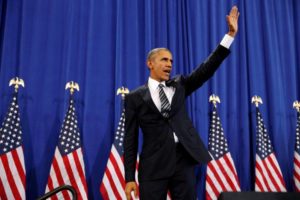by WorldTribune Staff, December 8, 2016
President Barack Obama dusted off the “blame Bush” card one last time as, in his final national security address, he said former President George W. Bush and Iraq’s leaders were largely responsible for the rise of Islamic State of Iraq and Levant (ISIL).
Most military officials and analysts believe that Obama’s withdrawal of forces from Iraq in 2011 was the decision most responsible for the rise of ISIL.

In his Dec. 6 speech at MacDill Air Force Base in Tampa, Florida, Obama pushed back against accusations that he did not try too keep forces in Iraq:
“There’s been a debate about ISIL that’s focused on whether a continued U.S. troop presence in Iraq back in 2011 could have stopped the threat of ISIL from growing,” Obama said. “And as a practical matter, this was not an option. By 2011, Iraqis wanted our military presence to end, and they were unwilling to sign a new Status of Forces Agreement (SOFA) to protect our troops from prosecution if they were trying to defend themselves in Iraq.
“We brought nearly 150,000 troops home from Iraq, consistent with the Status of Forces Agreement negotiated by the previous administration,” Obama told the audience.
Experts who served in Iraq at the time, along with members of Obama’s own National Security Council, dispute the idea that a SOFA could not be renegotiated based on the situation on the ground at the time.
“Obama didn’t try,” Senior Fellow at The Foundation for Defense of Democracies Bill Roggio said, adding “there certainly were restrictions with the agreement that was in place, [but] they just didn’t want to do it.”
Leon Panetta, Obama’s CIA director at the time of the withdrawal from Iraq, said that “it was clear to me — and many others — that withdrawing all our forces would endanger the fragile stability.”
The U.S. military strongly opposed complete withdrawal from Iraq at the time. Army Gen. Lloyd Austin, the ground commander of the Iraq War at the time, developed plans to keep 24,000 troops in Iraq after 2011.
Analysts generally agree that the withdrawal created an ideal situation for ISIL’s rise.
“This was not inevitable, nor pre-ordained,” Emma Sky, a top adviser of Army Gen. Ray Odierno, wrote in a 2015 piece for the New York Times.
“What [Obama] fails to acknowledge is that after the colossal mistakes at the beginning of the Iraq war, the United States midwifed the emergence, from 2007 to 2009, of an inclusive political order and gained Sunni support to defeat Al Qaida. The tragedy was that U.S. disengagement, and the overtly sectarian policies of Prime Minister Nuri Kamal al-Maliki, led it all to unravel.”
Some counterterrorism analysts have pointed to the rise of ISIL as an example of Obama being too slow to respond to an emerging threat.
While the United States has been successful in killing some key militant leaders, Obama’s “legacy has been tarnished by the way terrorist groups have regenerated and strengthened in the latter parts of his presidency,” said Robin Simcox, a fellow at the Heritage Foundation.
